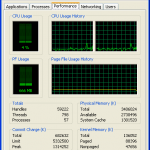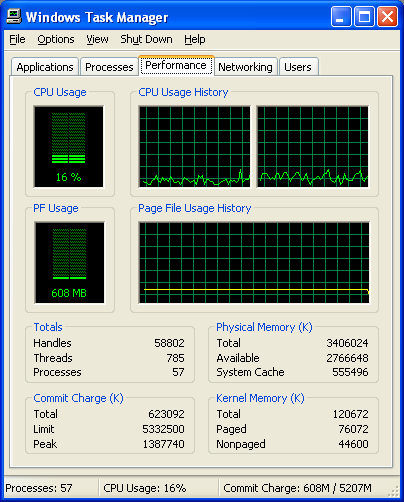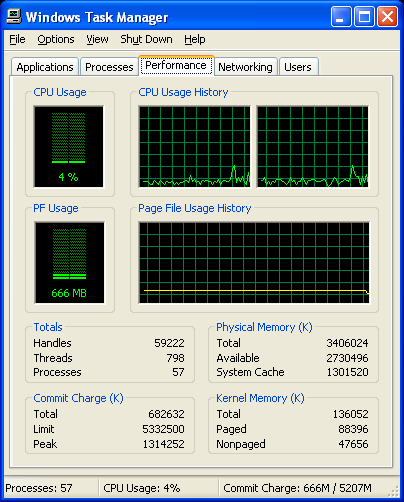I didn’t think it was possible, but I played even more Fallout 3 this week than last week. It’s really becoming an addiction now. And I think I need professional help. Which is why I’m buying the Prima Official Game Guide for Fallout 3, which should help me to get over this addiction quicker by finishing the game quicker.
But I did manage to get some work done. I made one minor update to the Is your computer fast enough for high definition DVD playback? guide. With my new computer, I thought it would be interesting to see how it does with the test described in this guide, and as expected, it passed with flying colours. I also added a new 1080p trailer encoded with MeGUI’s “Standalone Blu-ray” profile (made very little difference to the test results though). Continuing the theme, I decided to test Blu-ray playback performance, and with CPU utilization of less than 10% most of the time, I can safely say that the ATI Radeon HD range is very much recommended for building a Blu-ray capable PC, especially since it has HDMI audio pass-thru support as well. In the same blog entry, I also went over year to date Blu-ray sale stats. It’s worthwhile reading if you’re confused as to why Blu-ray companies refuses to drop prices, as the stats explain partly why.
Okay, enough with the intro. Let’s start with the news roundup.
 In copyright news, Valve software’s (makers of Half-Life) founder, Gabe Newell has said what everybody already thinks, that DRM is stupid. It really is stupid to have a strategy which alienates your legitimate customers so that software pirates are inconvenienced slightly more (the one or two days wait before finding a proper cracked version). Spore is now officially the year’s most pirated game, whether that’s due to the controversial DRM, the fact that it’s a great game (although there are other PC games that have been more in the “must-have” category, in my opinion, I won’t name names, except to say it ends in a ‘3’), nobody really knows. More DRM has certainly not helped matters, has it? And attracted mass protest and lots of bad publicity. And that’s why it’s stupid.
In copyright news, Valve software’s (makers of Half-Life) founder, Gabe Newell has said what everybody already thinks, that DRM is stupid. It really is stupid to have a strategy which alienates your legitimate customers so that software pirates are inconvenienced slightly more (the one or two days wait before finding a proper cracked version). Spore is now officially the year’s most pirated game, whether that’s due to the controversial DRM, the fact that it’s a great game (although there are other PC games that have been more in the “must-have” category, in my opinion, I won’t name names, except to say it ends in a ‘3’), nobody really knows. More DRM has certainly not helped matters, has it? And attracted mass protest and lots of bad publicity. And that’s why it’s stupid.
A couple of months ago, the MPAA came up with another one of their brilliant plans to add DRM to broadcasts. They then found themselves faceing very strong opposition from all sorts of groups (wow, what a surprise), and now they are saying the opposition to their evil plans has been astonishing. Should they really be that surprised? The MPAA will no doubt find out they’re one of the most hated interest groups in the world. Will they be shocked at this discovery too? Or that DRM is universally not liked by, well, almost everyone including many content owners? The biggest problem with DRM is that it’s a contract between content owners and consumers, but only one party has to hold up to the agreement. Already occurring many times is the situation where content owners switch to DRM-free content, turn off the DRM authentication servers, and leave DRM customers with useless files which they’ve paid for. If I go into a contract with you, with you paying me money for some kind of service, I shouldn’t be able to just walk away when it suits me. See, what content owners don’t get is that DRM is actually very costly to them, because DRM lasts a lifetime and that’s how long they have to support customers who purchased DRM. A team at Harvard argues that copyright provisions should allow DRM hacking when they’ve been abandoned, and legally speaking, it’s perfectly reasonable to break a contract when the other party has walked away from it.
A Danish court has slapped an ISP ban on The Pirate Bay. TPB is proving a very stubborn enemy for groups like the MPAA, because their popularity and political actions have propelled them to a different level. They’re not just some website that can be shut down, they represent a whole movement against established copyright traditions. If anything, groups like the MPAA should be working with TPB to find common ground and perhaps to see what can be done to both slow piracy and to improve Internet based services and pricing so people aren’t forced to pirate. And the current economic situation is forcing many more to go down this path.
 Speaking of the current economic situation, and high prices forcing people to go towards piracy, Blu-ray prices are being kept high intentionally, at least according to Pioneer.
Speaking of the current economic situation, and high prices forcing people to go towards piracy, Blu-ray prices are being kept high intentionally, at least according to Pioneer.
High manufacturing costs, low demand, licensing costs are issues, but the whole Blu-ray thing is now clearly being packaged as a high end alternative to DVDs, much like SACD versus the traditional CD. And it’s not just the hardware, but movie prices will remain high for the forseeable future as well, according to Sony. Now this must all seem a bit odd with Blu-ray currently trying to take over DVDs and not doing that great of a job of it. But is Blu-ray really here to take over DVD, or just to offer a high end alternative to get enthusiasts to hand over more money? A few days ago, I analysed the year to date sales figures for Blu-ray and what’s quite clear is that with the drop in DVD sales (or at least the lack of growth), Blu-ray is capable of more than making up for it, even though it is selling only in very small numbers. The year to date figures I have are obviously not a complete year, as we’re still in 2008, so if DVD sales make up the difference compared to last year in the time left and remain unchanged compared to 2007, then anything Blu-ray takes in (already $400+ million) is just a bonus for studios. And that’s all Blu-ray need to provide for studios to justify its own existence.
With lack of studio support, Amazon’s Black Friday sales were a clear disappointment when it came to Blu-ray. There were some bargains, like Indy 4, Kung Fu Panda, Iron Man all under $15. But the majority of Blu-ray titles remained at their high prices, and some even went up! There are currently lots of Blu-ray deals at the moment on Amazon, but none that really strikes me as a great bargain. If anything, there were more bargains at the same time last year, when competition with HD DVD forced the BDA to act. There were/are some hardware deals, such as Warner’s $100 off deal, but player prices are still too high to attract people. There were free movies with almost every Blu-ray player purchase last year, sometimes more than 5, but where are they now? If you do want a Blu-ray player, then the PS3 remains a good choice if you also want a media hub and game console. And it’s still the best performing (speed wise) Blu-ray player on the market. But it’s still overpriced, in my opinion.
Pioneer has developed a 400GB 16 layer Blu-ray disc that many players, including the PS3, will be able to read. Of course, one such disc may cost more than a PS3, or two, and do you really need 20 hours of content on a single easily damaged disc?
![]() And in gaming, the overpriced PS3 did badly against the Xbox 360 on Black Friday as expected, because Microsoft’s holiday bundles, NXE (New Xbox Experience), and various other things ensured it had the momentum to ensure a 3-to-1 sales advantage over the PS3. Here, you can get an Xbox 360 20GB (the older model) with two games for $299. The 60GB model with 3 free games is $399. To compare, the cheapest PS3 is $599 with one free game, and that’s on a special this weekend only deal. As a Microsoft rep said a few weeks ago, you can get an Xbox 360 plus a standalone Blu-ray player for cheaper, or a Wii, or save the money to buy 5 more games.
And in gaming, the overpriced PS3 did badly against the Xbox 360 on Black Friday as expected, because Microsoft’s holiday bundles, NXE (New Xbox Experience), and various other things ensured it had the momentum to ensure a 3-to-1 sales advantage over the PS3. Here, you can get an Xbox 360 20GB (the older model) with two games for $299. The 60GB model with 3 free games is $399. To compare, the cheapest PS3 is $599 with one free game, and that’s on a special this weekend only deal. As a Microsoft rep said a few weeks ago, you can get an Xbox 360 plus a standalone Blu-ray player for cheaper, or a Wii, or save the money to buy 5 more games.
And the cheapest version of the Xbox 360, the Arcade version, now also has a built-in 256 MB of memory to use with the NXE, plus it may be using the new Jasper motherboard revision, which includes a new 65nm GPU to reduce heat and improve stability. The Arcade bundle with one game only costs $289 here, that’s $100 less than the cheapest Wii bundle as well.
That’s all we have for this week. Back to Fallout 3 now. See you next week. Bye.






